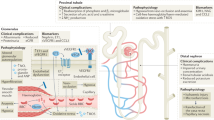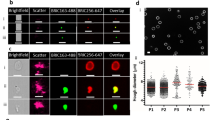Abstract
Sickle cell anaemia red cells (SS) were reported to have a high Ca content and an increased Ca uptake on deoxygenation1,2 but their Ca-pump activity was described as normal2. This seemed puzzling because the saturated Ca-extrusion rate of the normal, high Ca-affinity Ca pump is about 10 mmol per 1 cells per h (refs 3, 4) and the highest sickling-induced Ca influx reported in SS cells2,5 and observed in ATP-depleted sickle-trait (SA) red cells6 never exceeded 0.2 mmol per 1 cells per h. Normal pump performance is, therefore, incompatible with Ca accumulation unless SS cells have abnormally high Ca-binding capacity. We provide here evidence which suggests that SS cells have normal Ca-buffering capacity and probably genetically normal Ca pumps, but that the sickling process causes progressive Ca-pump failure and a marked reduction in Ca:Ca exchange.
This is a preview of subscription content, access via your institution
Access options
Subscribe to this journal
Receive 51 print issues and online access
$199.00 per year
only $3.90 per issue
Buy this article
- Purchase on Springer Link
- Instant access to full article PDF
Prices may be subject to local taxes which are calculated during checkout
Similar content being viewed by others
References
Eaton, J. W., Skelton, T. D., Swofford, H. S., Kolpin, C. E. & Jacob, H. S. Nature 246, 105 (1973).
Palek, J. J. Lab. clin. Med. 89, 1365 (1977).
Ferreira, H. G. & Lew, V. L. Nature 259, 47 (1976).
Schatzmann, H. J. & Roelofson, B. FEBS Symp. 42, 389 (1977).
Eaton, J. W., Berger, E., White, J. G. & Jacob, H. S. in Proc. Symp. Molecular and Cellular Aspects of Sickle Cell Disease (eds Hercules, J. I., Cottam, G. I., Waterman, M. R. & Schechter, A. N.) 327 (Publ. No. (NIH) 76–1007 Department of Health, Education and Welfare, Washington, 1976).
Bookchin, R. M. & Lew, V. L. J. Physiol., Lond. 284, 93P (1978).
Lew, V. L. & Brown, A. M. in Detection and Measurement of Free Ca in Cells (eds Ashley, C. C. & Campbell, A. K.) (Elsevier, Amsterdam, in the press).
Ferreira, H. G. & Lew, V. L. in Membrane Transport in Red Cells (eds Ellory, J. C. & Lew, V. L.) 53 (Academic, London, 1977).
Clark, M. R., Unger, R. C. & Shohet, S. B. Blood 51, 1169 (1978).
Lew, V. L. & Ferreira, H. G. Nature 263, 336 (1976).
Sarkadi, B., Szasz, I. & Gardos, G. J. Membrane Biol. 26, 357 (1976).
Dixon, E. & Winslow, R. M. Fedn Proc. 38, 1127 (1979).
Lessin, L. S. & Wallas, C. Blood 42, 978 (1973).
Fischer, S., Nagel, R. L., Bookchin, R. M., Roth, E. F. & Tellez-Nagel, I. Biochim. biophys. Acta 375, 422 (1975).
Harrison, D. G. & Long, C. J. Physiol., Lond. 199, 367 (1968).
Author information
Authors and Affiliations
Rights and permissions
About this article
Cite this article
Bookchin, R., Lew, V. Progressive inhibition of the Ca pump and Ca : Ca exchange in sickle red cells. Nature 284, 561–563 (1980). https://doi.org/10.1038/284561a0
Received:
Accepted:
Issue Date:
DOI: https://doi.org/10.1038/284561a0
This article is cited by
-
Amine-modified nanoplastics promote the procoagulant activation of isolated human red blood cells and thrombus formation in rats
Particle and Fibre Toxicology (2022)
-
Functional significance of the intermediate conductance Ca2+-activated K+ channel for the short-term survival of injured erythrocytes
Pflügers Archiv - European Journal of Physiology (2010)
-
Calcium homeostasis of human erythrocytes and its pathophysiological implications
Klinische Wochenschrift (1991)
-
Intracellular calcium content of human erythrocytes: Relation to sodium transport systems
The Journal of Membrane Biology (1987)
-
Compartmentalization of sickle-cell calcium in endocytic inside-out vesicles
Nature (1985)
Comments
By submitting a comment you agree to abide by our Terms and Community Guidelines. If you find something abusive or that does not comply with our terms or guidelines please flag it as inappropriate.



